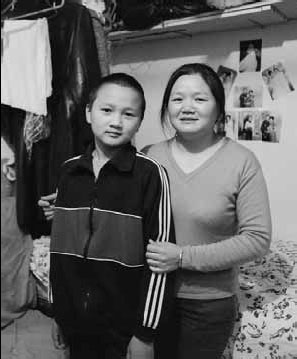Cleaning life is all about pension
Updated: 2012-05-06 07:56
By Xu Lin(China Daily)
|
|||||||||
|
Liu Chengmei and her 12-year-old son Gao Decan. |
Liu Chengmei never thought she'd have to be a cleaner for 15 years to get a pension.
Liu, 37, from Chongqing municipality, makes 1,600 yuan ($255) per month in a medical examination center near Beijing's Xizhimen in the Xicheng district.
According to the Beijing Municipal Bureau of Human Resources and Social Security, people from other cities who work in the capital can get a pension in Beijing when they reach the legal retirement age - if they pay endowment insurance for 15 years cumulatively.
"I'm eager to have a pension, just like the local people. Even 300 or 400 yuan per month is satisfying," she says.
Her husband is a guard in an office building, with a monthly income of 2,000 yuan. Her 12-year-old son Gao Decan is a fifth-grade student in a primary school.
The family of three squeezes into a 9-square-meter room in a basement in Chaoyang district and pays a monthly rent of 500 yuan - plus charges for water and electricity. Five yuan buys a shower in the bath center in the building.
They live a simple life. Apart from the rent, their living cost in the capital is less than that in their hometown. She buys necessities she can store, such as cooking oil, whenever she finds them on sale.
In 2005, they spent 110,000 yuan on a 120-square-meter house in their hometown. They are still paying the mortgage.
Liu gets up at 6:30 am and rides her electric bicycle for half an hour to go to work.
She distributes breakfast to more than 100 people every day, stooping as many as five times to hand out one meal.
She also does dishes, cleans the center and empties the garbage. But she looks for ways to save her energy. Her legs hurt so much at the end of the day, she has to rest them on a chair when she gets home at 4:30 pm.
To make more money, she cleans part-time and earns nearly 300 yuan a month on average.
"I was very depressed. I wondered why I had to work so desperately. I just hope to live a better life in the future," Liu says.
She had to be a sweeper because other jobs such as being a cashier in the supermarket doesn't offer the endowment insurance.
She says most migrant workers she knows don't consider the insurance issue when they hunt for a job.
"It's all for the pension. So I had to choose the workplace that's far away from my home," she says.
Her mother, step-father and younger brother are all migrant workers in other cities.
"It's better than staying at home. As there is not enough cultivated land, the harvest is insufficient to feed us," says Liu, who started work when she was 17.
In 1998, she came to Beijing as a migrant worker with only a junior middle school education.
Liu got married when she was 24. She went back to Chongqing to give birth to her son and had to leave him at home when he was only 8 months old, so she could come back to Beijing to work.
She rarely goes back home.
In 2003, her father passed away and she only stayed at home for 10 days.
Sometimes her son missed the family so much that he called his uncle and aunt as "dad" and "mom" by mistake.
"We don't have much time to be with him but we can at least give him parents' love," she says.
Liu's biggest concern: whether her son can one day take the college entrance exam in Beijing.
She's not certain because the policy may change, so that children of migrant workers, who don't have Beijing hukou, the urban household registration status, can take the exam in the city.
"If we go back to Chongqing for his middle- school education, I have to give up my endowment pension.
"It's a pity because there's only five years to go," she says. She says she's going to take a gamble and let him stay in Beijing.
Like her, he likes the city.
xulin@chinadaily.com.cn
(China Daily 05/06/2012 page4)
